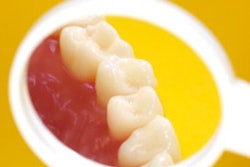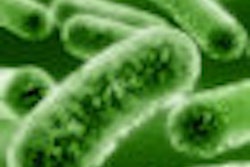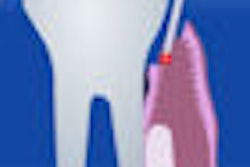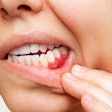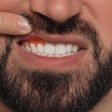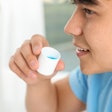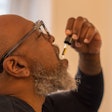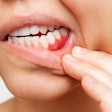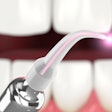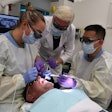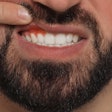
Caries seems to run in families, and some ethnic groups appear to suffer more from it than others. The same goes for periodontal disease. So along with questions about your patients' drug use and brushing habits, should you ask how many teeth their parents have?
Not according to official guidelines for assessing patients' caries and periodontal disease risk factors. But the latest research, including a pair of studies published this month, suggests that genes could account for as much as half of an individual's propensity toward caries and periodontitis.
"We do believe there is a strong genetic component," said Alexandre Vieira, D.D.S., Ph.D., senior author of both papers and an assistant professor of oral biology at the University of Pittsburgh School of Dental Medicine.
— Alexandre Vieira, D.D.S., Ph.D.,
University of Pittsburgh
Someday, he said, dentists will be able to analyze their patients' genes, then prescribe new medicines enhancing their ability to resist caries and periodontitis. While cautioning that this day has not yet arrived, Dr. Vieira outlined intriguing evidence for the possibilities.
In his first paper, published online April 6 by the Journal of Dental Research, Dr. Vieira and colleagues from the University of Pittsburgh and Ondokuz Mayis University looked at variations in a gene known as DEFB1 (defensin, beta 1). This gene produces beta-1 defensins, a type of protein that attacks bacteria and viruses and signals other immune responses. Earlier research, they said, found that people secrete these beta-1 defensins into their mouths in response to the presence of microbes.
The researchers used data from 296 University of Pittsburgh dental patients who had given saliva samples. They found no correlation between variants of DEFB1 and periodontal disease. But they did find that patients who had one variant (rs11362, or G-20A) were more than five times as likely to have decayed, missing, or filled teeth than patients without that variant (p = 0.007). On the other hand, patients with the rs179946 (G-52A) variation were only a third as likely to have this kind of damage to their teeth (p = 0.014).
The perio families
In the second study, published in the online journal PLoS One (April 2010, Vol. 5:4, pp. 1-10), Dr. Vieira teamed up with 11 colleagues from the University of Pittsburgh and six Brazilian institutions. The researchers recruited 389 Brazilian individuals in 76 nuclear families that included both parents of children with aggressive periodontitis.
The researchers took saliva samples from these subjects and studied genes from a region of chromosome 1 that had previously been implicated in periodontal disease. They compared whether the patients had inherited more or less than half of the variants from one parent. They found an association between the disease and two variants of the gene FAM5C.
"This gene has been associated with heart patients," Dr. Vieira said. "It's very interesting to see the same gene associated with this disease."
In a separate phase of the study, the researchers took biopsies of gingival tissue from 57 healthy Brazilians and 46 Brazilians with aggressive periodontitis and found significantly greater signs of the protein coded by the FAM5C gene in the disease tissue than in the healthy tissue.
Since the FAM5C gene makes a protein involved in the mitochondria -- the energy-producing part -- of a cell, it appears to make cells go into overdrive. Much of the damage caused by periodontitis results from inflammation, so ramping up the activity of cells in the process might make the damage worse, Dr. Vieira theorizes.
He imagines that one day researchers might put something like beta-1 defensin in pills or toothpaste that could attack Streptococcus mutans and other bacteria that cause the disease. On the other hand, they might want to find a substance that can suppress the FAM5C protein to calm inflammation of patients with aggressive periodontitis.
What to do
All that's off on the horizon, though. Is there anything doctors can do now to make use of this knowledge?
Some leading dental organizations, including the ADA, are already encouraging practitioners to divide their patients into different categories depending on their risk of caries, then apply more extensive preventive measures -- such as more frequent professional cleaning and the use of fluoride, sealants, chlorhexidine, and xylitol -- to the patients at greatest risk. Some experts are advising a similar approach for periodontitis.
But Dr. Vieira thinks it's too early to add family dental history to the risk assessment forms for these dental diseases. "Family history suggests not only genetic components but a set of behaviors," he said. "If mom and dad don't care about brushing their own teeth, it's likely the kid will not see a toothbrush for several years."
Dentists already ask patients about these behaviors, so finding out about the parents would be redundant, he said. And even if they did ask the question, they might not get the right answer since patients can't always answer detailed questions about their relatives' dental health. "Usually the dentist does not examine the parent," he pointed out.
Douglas Young, D.D.S., M.B.A., M.S., an associate professor of dentistry at the University of the Pacific Arthur A. Dugoni School of Dentistry who helped devise the California Dental Association's (CDA) caries risk assessment form, agrees that it's too early to revise that document with a dental family history question.
"There is no validation," he said. "We used 2,000 to 3,000 charts at UCSF [the University of California San Francisco] to validate the CDA form. There are very few studies that correlate genes to future caries."
But it won't hurt for dentists to ask their patients about their parents' oral health, according to Dr. Young. "It's a good question to ask. I just don't know what to do with the answer," he said.
Copyright © 2010 DrBicuspid.com




